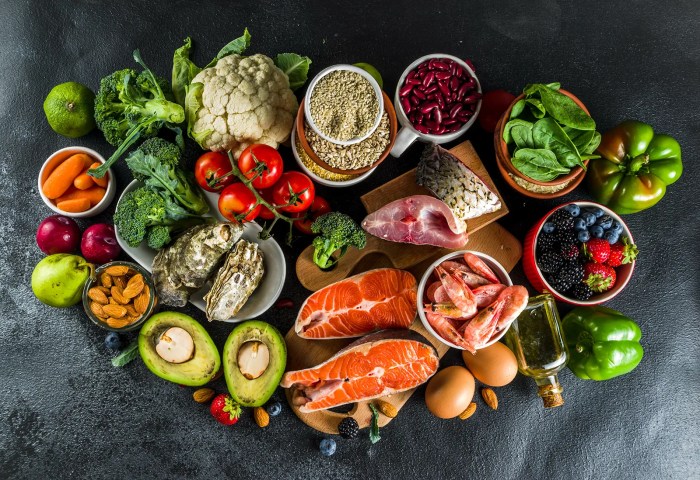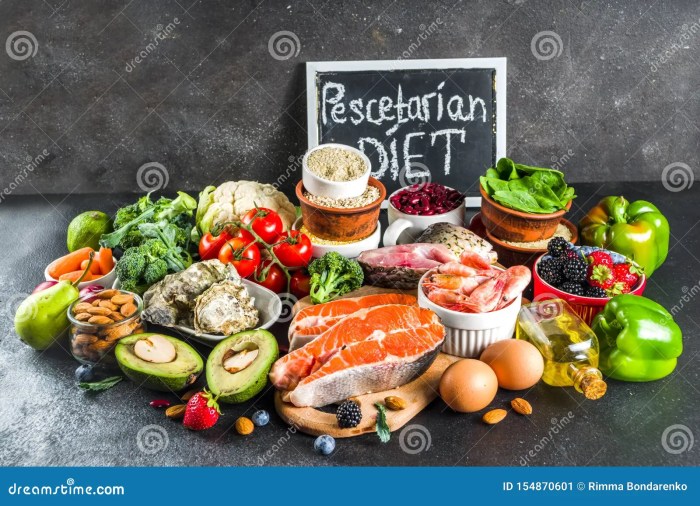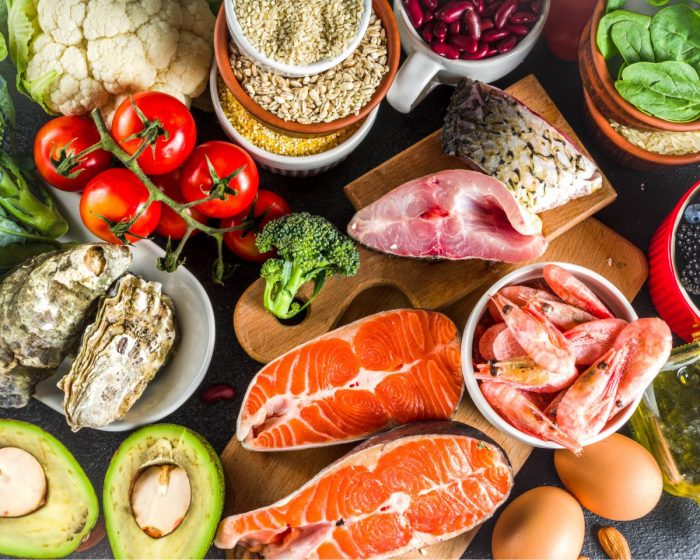Embark on a culinary journey with a healthy pescetarian diet, where the flavors of the sea and the goodness of plants intertwine to nourish your body and mind.
Discover the science-backed benefits, explore a diverse range of food sources, and delve into the environmental impact of this sustainable dietary choice.
Definition of a Healthy Pescetarian Diet
A pescetarian diet is a type of vegetarian diet that includes fish and other seafood, but excludes meat and poultry. It is a healthy and sustainable way to eat that can provide a variety of nutrients.
Key components of a healthy pescetarian diet include:
- Plenty of fruits and vegetables
- Whole grains
- Legumes
- Nuts and seeds
- Fish and other seafood
Pescetarian diets are similar to other vegetarian diets in that they emphasize plant-based foods. However, pescetarians also eat fish and other seafood, which provide a good source of protein, omega-3 fatty acids, and other nutrients.
If you’re considering adopting a vegetarian diet, it’s important to ensure you’re getting all the nutrients your body needs. A vegetarian diet list can help you plan a balanced meal plan that includes plenty of fruits, vegetables, whole grains, and legumes.
Differences Between Pescetarianism and Other Vegetarian Diets, Healthy pescetarian diet
Pescetarianism is different from other vegetarian diets in that it includes fish and other seafood. This means that pescetarians can get some of the same nutrients that meat-eaters get, such as protein, omega-3 fatty acids, and vitamin B12.
However, pescetarians do not eat meat or poultry, which means that they need to make sure they are getting enough protein from other sources, such as beans, lentils, and tofu.
Benefits of a Healthy Pescetarian Diet

Adopting a pescetarian diet offers numerous health advantages. Scientific research consistently demonstrates its positive impact on overall well-being.
Role of Omega-3 Fatty Acids in Heart Health and Inflammation
Pescetarian diets are rich in omega-3 fatty acids, essential nutrients primarily found in oily fish. These fatty acids play a crucial role in maintaining cardiovascular health. Studies have shown that regular consumption of omega-3s can reduce the risk of heart disease, stroke, and arrhythmias.
Moreover, omega-3s possess anti-inflammatory properties, which may help alleviate chronic inflammatory conditions such as arthritis, asthma, and inflammatory bowel disease.
Weight Management
A pescetarian diet can be an effective tool for weight management. Fish is a lean protein source that promotes satiety and helps regulate appetite. Additionally, the high fiber content in fruits, vegetables, and whole grains found in a pescetarian diet contributes to a feeling of fullness, further aiding in weight loss efforts.
Cognitive Function and Chronic Disease Prevention
Omega-3 fatty acids have also been linked to improved cognitive function and reduced risk of neurodegenerative diseases such as Alzheimer’s and Parkinson’s. The antioxidant properties of fruits and vegetables in a pescetarian diet further protect against oxidative stress, which can damage cells and contribute to chronic diseases like cancer and heart disease.
Food Sources and Meal Planning

A healthy pescetarian diet emphasizes a variety of nutrient-rich foods from both plant and animal sources. Understanding the appropriate food choices and incorporating them into balanced meals is crucial for optimal health outcomes.
To ensure a well-rounded pescetarian diet, it is essential to include a diverse range of foods from the following categories:
Fish and Seafood
- Fatty fish: Salmon, tuna, mackerel, herring, sardines, anchovies
- Lean fish: Cod, haddock, flounder, sole, tilapia
- Shellfish: Shrimp, lobster, crab, oysters, clams, mussels
These foods are excellent sources of omega-3 fatty acids, protein, and essential vitamins and minerals.
Plant-Based Proteins
- Legumes: Beans, lentils, chickpeas, tofu, tempeh
- Nuts and seeds: Almonds, walnuts, chia seeds, flax seeds
- Soy products: Edamame, miso, tempeh
Plant-based proteins provide essential amino acids, fiber, and other beneficial nutrients.
Whole Grains
- Brown rice
- Quinoa
- Oats
- Whole-wheat bread
Whole grains are rich in fiber, complex carbohydrates, and essential vitamins and minerals.
Embarking on a vegetarian journey? Look no further than our comprehensive vegetarian diet list for an array of plant-based options to nourish your body and mind.
Sample Meal Plans
Here are examples of balanced meal plans that demonstrate the incorporation of various nutrient-rich foods into a pescetarian diet:
- Breakfast:Oatmeal with berries and nuts; tofu scramble with vegetables
- Lunch:Salad with grilled salmon, quinoa, and mixed greens; lentil soup with whole-wheat bread
- Dinner:Pan-seared tuna with roasted vegetables; pasta with marinara sauce and shrimp
- Snacks:Apple with almond butter; Greek yogurt with berries
These meal plans provide a variety of essential nutrients and promote overall well-being.
Nutritional Comparison of Fish and Seafood
| Nutrient | Salmon | Tuna | Cod | Shrimp |
|---|---|---|---|---|
| Calories | 208 | 175 | 70 | 120 |
| Protein (g) | 21 | 28 | 15 | 20 |
| Fat (g) | 12 | 6 | 1 | 2 |
| Omega-3 fatty acids (mg) | 2,260 | 1,500 | 200 | 100 |
| Vitamin D (IU) | 570 | 360 | 400 | 0 |
| Iron (mg) | 1.0 | 1.2 | 0.4 | 1.0 |
This table highlights the variations in nutritional content among different fish and seafood options, enabling informed choices to meet individual dietary needs.
Sustainability and Environmental Impact: Healthy Pescetarian Diet

A pescetarian diet can be more sustainable compared to other dietary choices, particularly those that emphasize meat consumption. Reducing meat intake and increasing plant-based food intake can have significant environmental benefits.
Meat production, especially from livestock like cattle, contributes to greenhouse gas emissions, water pollution, and deforestation. Livestock grazing requires vast amounts of land and water, and the methane produced by their digestive systems is a potent greenhouse gas. By reducing meat consumption, pescetarians can help mitigate these environmental impacts.
Sustainable Seafood Options
When choosing seafood, it’s important to consider sustainability. Opt for fish and shellfish from well-managed fisheries that employ sustainable practices. Look for certifications like the Marine Stewardship Council (MSC) or the Aquaculture Stewardship Council (ASC) to ensure your seafood choices are environmentally responsible.
Challenges and Considerations
Embracing a pescetarian diet offers numerous health benefits, yet it’s not without its potential challenges. Understanding these considerations and implementing strategies to address them can ensure a balanced and fulfilling dietary experience.
One potential concern is nutrient deficiencies, particularly vitamin B12, which is primarily found in animal products. However, fortified foods, such as plant-based milk and nutritional yeast, can provide adequate intake. Additionally, supplementation may be necessary to meet daily requirements.
Mercury Exposure
Mercury contamination in fish is a potential concern. Choosing fish low in mercury, such as salmon, tuna, and sardines, and limiting consumption of larger predatory fish like swordfish and shark can help minimize exposure.
Social Factors
Social pressures can arise when dining out or attending social events where pescetarian options may be limited. Politely informing hosts of dietary preferences and exploring alternative dishes can help navigate these situations.
Final Thoughts
As you embrace a healthy pescetarian diet, you not only enhance your well-being but also contribute to a healthier planet. Let this guide be your compass, empowering you to make informed choices and unlock the transformative power of a balanced and sustainable lifestyle.
FAQ Corner
Is a pescetarian diet considered a vegetarian diet?
No, pescetarians include fish and seafood in their diet, while vegetarians exclude all animal products.
Can a pescetarian diet provide enough protein?
Yes, fish, seafood, and plant-based sources like beans, lentils, and tofu provide ample protein for a healthy pescetarian diet.
Are there any risks associated with a pescetarian diet?
As with any diet, it’s essential to ensure a balanced intake of nutrients. Pescetarians should pay attention to vitamin B12 levels and consider supplementation if necessary.